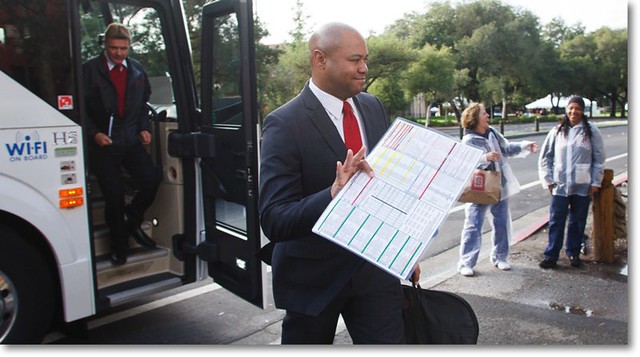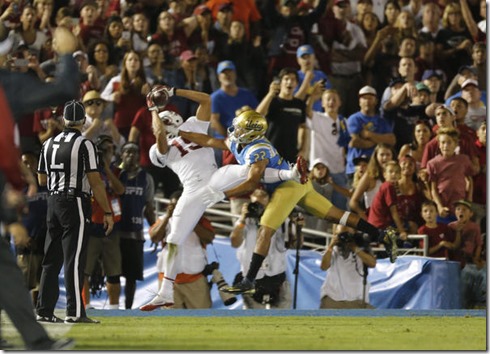david shaw
[MLive]
The Question:
Brian: So that Mike DeBord quote I posted in UV reminded me that I now root against Tennessee in just about every game they play because they hired a coach who I think is not good at coaching. That's a pretty weird reason to wish pain and demise on a program. What is your weirdest reason you hate on a CFB program?
Seth: Other than Scott Frost’s mom you mean?
Brian: Some people want to hit Scott Frost's mom with a shovel for obscure reasons. Can't be helped. Mmmbop.
Seth: Michigan fans will cut you.
-------------------------------------
The Responses:
no no no no no no no no no no just stop making these
Ace: In the conversation that led to this question, Brian mentioned rooting against Stanford because of David Shaw’s crimes against game theory. I have an entirely different reason. When I was checking out colleges after my junior year of high school, my dad turned a Bay Area business trip into a college tour, and at the time I really liked the idea of going to Stanford.
We joined one of their campus tours. The campus was gorgeous, the university essentially sold itself—and then our guide started talking football. Specifically, he brought up The Play—yes, this play—as a selling point for Stanford, saying some hogwash about how it was really the best reflection of Stanford football since they lost but their band did something wacky. (Notably, this was pre-Harbaugh.)
This offended me to my core. Whenever I’m watching Stanford and I think back to this moment, I hope David Shaw takes his criminally bad game management to new lows. The fans won’t care, anyway.
(I still applied to Stanford. I did not get in. That _totally_ doesn’t play a role here.)
[After the JUMP: screw you and your whole coast]
[Gina Ferazzi – LA Times]
It seems like the season just started, but we’re already in thick of conference play – the SEC had three ranked-vs-ranked matchups (and two wound up being blowouts), the Big Ten had an important cross-divisional game between Michigan State and Wisconsin – a rousing Badger win – and there were some interesting results in the Pac-12. In the end, there weren’t any major upsets near the top, leaving the playoff picture much the same as it was before the weekend. Despite the uncompetitive nature of some of Week Four’s best fixtures, college football still managed to produce its share of exciting games, as always.
Pac-12
--- Perhaps we should expect STANFORD to be capable of some brutish, low-scoring slobberknockers, but it was still disorienting to see a Pac-12 game with such little offense; the Cardinal defeated UCLA 22-13 after a late touchdown drive to notch their first trip to the end zone of the day (a scoop-and-score on the game’s last play took the score from 16-13 to the final margin). David Shaw’s game management was again questionable: Stanford got the ball with about six and a half minutes left and took almost two minutes to go three-and-out and punt on 4th-and-1, even though they have one of the best backs in the country in Christian McCaffery (and they even somehow wasted a timeout in that sequence).The conservative strategy wound up working out – UCLA wasn’t able to salt the game away with first downs, Stanford got the ball back, and, looking like a completely new offense, marched down the field for the game-winning touchdown with 24 seconds left. McCaffery was largely held in check by the Bruin defense, turning in 138 yards on 26 carries. UCLA has now lost eight in a row to Stanford.
[more on the week that was after the JUMP]

Not a giant check, but it might as well be (via)
Stanford head football coach David Shaw said a bunch of seemingly insightful stuff about the potential pitfalls of paying student-athletes to Fox Sports' Bruce Feldman. Actually, that's not totally fair—he made a couple actually insightful points in here amid the opinion that his players shouldn't be paid [emphasis mine]:
"I think where people don't completely understand it, is that there is a hard line in the difference between unionization and paying players and using the player's image," Shaw told FOX Sports. "Those are two completely different worlds. I don't believe at all that we should be paying student-athletes. I think they should remain student-athletes. I think they should remain amateurs. I do think we should do more for them and make their lives better, which I'm excited about doing. On the other side, I think there are a lot of things that we have to work on with players' images and what they can do with their own image and what we can do with their own image, and that is going to bear out in the courts. A lot of people have mixed all those things in together, but I think there is hard line between those two worlds.
The stuff is bold is all true, and while he maintains the party line of not wanting to pay players directly, he leaves it open for athletes to at least profit off the use of their own likenesses, which is a pretty good start.
My problem comes with what he said next. The NCAA and its proponents have made an art form out of presenting an issue as an unconquerable barrier when a simple solution is either apparent or already in place, and Shaw is no exception here:
"One is truly an individual thing, 'This is my face. This is my body. This is me, and no one should be able to make money off my image. And I completely understand that. But at the same time, you're a student-athlete. If we're going to pay for your education, if we're paying for your schooling, if we're paying for room and board and if we're paying for all those other things -- to say that we need to pay you more money on top of that just because we have a TV contract to me is a little bit different because now you're skewing what they're there for, which is to play great football, yes, but it's also is to go to school to learn and to learn how make a living. I've been saying this for years: It's our job to teach them how to make a living at the university and not to give them their living at the university. Then, we're not teaching the proper lessons at the school."
It's our job to teach them how to make a living at the university and not to give them their living at the university.
Says who, exactly? I've yet to read a compelling argument that college athletes with extra money will bring down the entire enterprise.* Is the concern about a paid college athlete's motivation to stay on top of academics, as Shaw goes on to state later in the article? Funny, because the NCAA already has academic standards in place that require athletes to at least play some school at a passable level, and every institution has their own academic requirements for students to remain on scholarship—if anybody should know this, it's David Shaw. If an athlete chooses to live it up instead of go to class, they will soon find themselves looking for another place to not go to class.
Is the concern that college students can't handle the balance between wealth and responsibility? Because there are easy solutions to that, too. The O'Bannon case could very well end in a settlement that sets up athletes getting paid via trust fund, so they won't touch that extra money until after they've graduated or exhausted their eligibility. Problem solved.
There's also the fact that schools such as Stanford and Michigan already boast a large population of rich students, and these students somehow manage to find the right balance between throwing around their (parents') cash and earning a diploma. Stanford's tuition is currently $14,230... per quarter. Michigan's out-of-state tuition is $40,496, and those students now make up around 40% of the student body.
I went to U-M. I walked through fraternity and sorority parking lots filled with BMWs and Mercedes and Lexuses bearing New York license plates. The students driving those cars have to show up to class and get decent grades just like any other student, and the vast majority seem to manage this just fine. If we're living in fear of rich college students, we've already lost the war.
Meanwhile, there's this:
Stanford's success on the football field — and its desire to maintain that success — resulted in the university nearly doubling the pay of its head coach to more than $2 million from 2010 to 2012, new federal tax records show.
David Shaw was credited with just over $2 million in total compensation during the 2012 calendar year nearly $950,000 more than the amount the school reported paying Jim Harbaugh in 2010.
...
His total compensation included a little more than $1.175 million in base pay; $290,000 in bonuses and more than $470,000 in retirement or other deferred compensation. In December 2012, the university announced that he received a contract extension, so he is likely making much more now.
The system has been very good to David Shaw. It's time David Shaw and the others that have profited so extravagantly off the enterprise of college sports stop acting like it's a failure if the athletes actually playing those sports get the living they've earned, not just some vague promise that it'll all pay off eventually if they stop complaining and keep playing for the millionaires.
----------------
*Especially since—surprise!—a lot of them are already getting a healthy amount of cash on the side, and yet the world still turns.



234